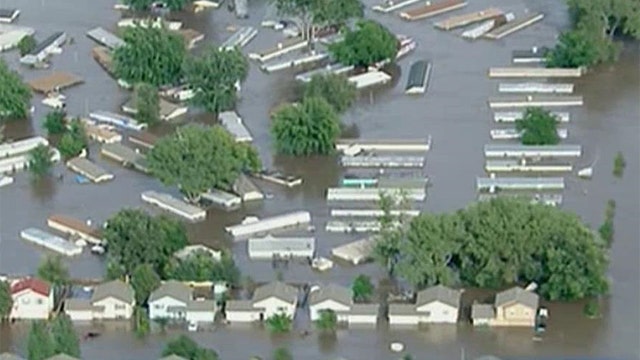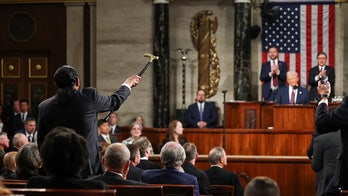FEMA claims it overpaid flood victims, demanding money back
Adam Housley reports from Los Angeles
No one likes getting a message from a bill collector -- especially if it's from the federal government, and at Christmas time.
Yet that's the predicament for hundreds of people who are still trying to rebuild their lives from Colorado's historic flooding, more than a year after the fact.
Nearly 250 flood victims have gotten what are known as recoupment letters from the Federal Emergency Management Agency (FEMA). The letters demand payback for government checks victims received following the 2013 floods, which caused an estimated $2 billion in property losses across more than 2,000 square miles.
"It's coming at a time [when] people are still recovering. They're traumatized, and then they get a letter like this and they're re-traumatized and it's particularly difficult during the holiday season," Stephanie Walton, who manages the Long-Term Flood Recovery Group for Boulder County, told Fox News.
Walton's nonprofit is helping victims make sense of the surprise government notices. "They come across pretty intimidating," Walton said. "It can be very confusing to people because they are not expecting it."
She said the notices warn about how the government could garnish wages and go to a collection agency to get the money back.
The amounts owed range from $200 up to $20,000. FEMA, as the result of its audits, now believes the payments were originally made in error. The agency estimates recoupment letters have gone to less than 2 percent of the total number of survivors who got $61 million in assistance.
But while there may have been some mistakes or misunderstandings over aid, advocates say real need exists.
Recipients were given 30 days to repay, or up 60 days to appeal. FEMA says it does not send recoupment letters out during the holidays. But in this case, the appeals deadline does hit in the midst of the holiday season.
Flood victim residents did not want to go on the record with Fox News for this story, citing fear of drawing attention to their cases. The local FEMA office initially agreed to an interview, but backed out and handed the inquiry to FEMA headquarters in Washington, D.C.
FEMA Director of Public Affairs Rafael Lemaitre said in a statement: "FEMA is committed to being responsible stewards of taxpayer dollars and ensuring that eligible applicants receive the disaster assistance they need. ... Throughout the disaster relief application process, FEMA performs quality checks and audits for payments made in error. Unfortunately, whether through fraud, human or accounting errors, or other reasons, assistance sometimes goes to individuals who are not eligible."
Generally, FEMA cannot pay what insurance would cover. FEMA also points to federal law which requires federal agencies to recover improper payments.
It's a "no-win situation," explained former head of FEMA Michael Brown, who is based in Colorado. "You have this triangle of everyone's fighting over who's responsible for what. And the person caught in the middle, rightly or wrongly, is the victim. All they want to do is just get their lives back to normal."
Brown says when a major disaster like this strikes, there is tremendous pressure to send funding to victims as quickly as possible. Audits happen later.
"FEMA will get hauled before Congress, and Congress will then scream at FEMA for 'why did you waste taxpayer money?' So, the very same congressman that put pressure on FEMA to get money out the door as fast as possible, will be the same people who will then criticize FEMA," he said.
He pointed out there's always a disclaimer when money is handed out -- it is contingent on qualifying, and if people do not qualify, they may have to pay it back. But, he said, "when you're under stress, you're under duress, you don't hear that."
Fox News' Adam Housley contributed to this report.













































